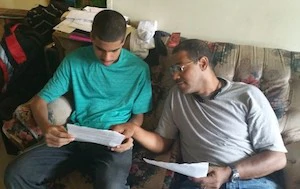Published 2018
Fathers Raising Responsible Men
Program Description
 "The Bronx needs more programs that are geared to parents ... Programs like this can bring more discussions about things that we think about, but don't always talk about."
"The Bronx needs more programs that are geared to parents ... Programs like this can bring more discussions about things that we think about, but don't always talk about."
- Hector Terrero, 38, participant in FRRM, as quoted in the 2015 New York Times article, “Bronx Program Encourages Fathers to Talk about Sex”
Fathers Raising Responsible Men (FRRM) is a Teen Pregnancy Prevention (TPP) program focused on males, designed to reduce risky adolescent male sexual behavior by supporting father-son communication about sex and sexual and reproductive health services. FRRM provides fathers with guidance on positive parenting topics, such as relationship-building, positive youth development, effective parental monitoring, and supervision. It strives to help fathers talk to their sons about masculinity and how it affects behavior, delaying sexual debut, making decisions about sex, using condoms, and seeking sexual and reproductive healthcare.
FRRM is one of a few TPP programs designed specifically for young men and is undergoing a rigorous evaluation to contribute to the evidence base in this area. It is funded through a collaborative initiative between the Office of Adolescent Health (OAH) and the Centers for Disease Control and Prevention (CDC) that supports piloting and evaluating innovative interventions designed to reduce young men’s risk of fathering a teen pregnancy.
- Population: Black and Latino adolescent males (ages 15-19) and their fathers or other primary adult male caregivers
- Locations: Mott Haven and surrounding areas, South Bronx, New York City
Goals
Reduce number of teens’ unprotected sexual encounters by:
- Strengthening father-son communication about sexual decision-making
- Delaying sexual debut among those who are not yet sexually active
- Reducing the frequency of sex among those who are sexually active
- Increasing knowledge and skills for correct and consistent use of condoms
- Increasing the use of reproductive health services, including testing for HIV and other sexually transmitted infections (STIs)
Strategies
Father coaches
Fathers Raising Responsible Men consists of two 60- to 90-minute sessions with the father and a “father coach.” Using role-playing and other interactive activities, coaches help fathers become comfortable talking with their sons about sex and the correct and consistent use of condoms. Coaches also teach fathers about common beliefs (both true and false) teens have about sex and condoms, the risks associated with teen sex, the important role fathers have in influencing their adolescent son’s sexual decision-making, and how fathers can support adolescent male access to sexual and reproductive health services such as HIV and STI testing.
Supplemental materials
As a complement to the coaching sessions, the program also provides a “communication toolkit” (including stories and other activities for fathers and sons to share), a workbook, a video, and access to an app for finding reproductive health services. These supplemental materials provide fathers and sons with additional tools and tips to support father-son communication beyond the coaching sessions.
Stats at a Glance
- 35.3 Mott Haven teen birth rate (per 1,000 females ages 15-19) in 2015*1
- 22.3 national teen birth rate (per 1,000 females ages 15-19) in 20152
- 250 father/son pairs expected to be recruited by end of 2018
* Reflects the most recent year for which data are available.
In Focus: Bruce and Victor
Bruce, a 16-year-old, has lots of questions about girls. Victor, his father, an immigrant from Honduras, used to struggle to communicate about sex, a topic that is not typically discussed in his culture. “We come from a country where no one talks about it,” he said. FRRM helped Victor get more comfortable talking with Bruce about the importance of delaying sex and protecting himself and his partner when he is ready to have sex. Bruce, who is already close to his dad, appreciates the heart-to-heart talks. (As quoted in the 2015 New York Times article, “Bronx Program Encourages Fathers to Talk about Sex”)
Grantee Information
Vincent Guilamo-Ramos
Director, Center for Latino Adolescent and Family Health
(212) 998-5981
vincent.ramos@nyu.edu
http://www.clafh.org/
Print the full success story here.
About the TPP Program
The Office of Population Affairs (OPA) Teen Pregnancy Prevention (TPP) program is a federal grant program that funds diverse organizations working to prevent teen pregnancy across the United States. OPA invests in both the implementation of evidence-based programs and the development and evaluation of new and innovative approaches to prevent teen pregnancy. The OPA TPP program reaches adolescents ages 10-19, with a focus on populations with the greatest need in order to reduce disparities in teen pregnancy and birth rates.
Footnotes
1 New York City Dept. of Health and Mental Hygiene. (2015). Teen Natality by Community District of Residence, New York City, 2000-2015. https://a816-healthpsi.nyc.gov/epiquery/sasresults.jsp?_PROGRAM=/EpiQuery/Birth/BIRTH_SP2&qtype=cd_teen&row=none&pop=cd_teen&cd=201&year=2015&mapvar=brate. back to top
2 Martin, J.A., Hamilton, B.E., Osterman, M.J., Driscoll, A.K., & Mathews, T.J. (2017). Births: Final data for 2015. National Vital Statistics Report, 66(1). Hyattsville, MD: National Center for Health Statistics. https://www.cdc.gov/nchs/data/nvsr/nvsr66/nvsr66_01.pdf. back to top
 An official website of the United States government
An official website of the United States government
